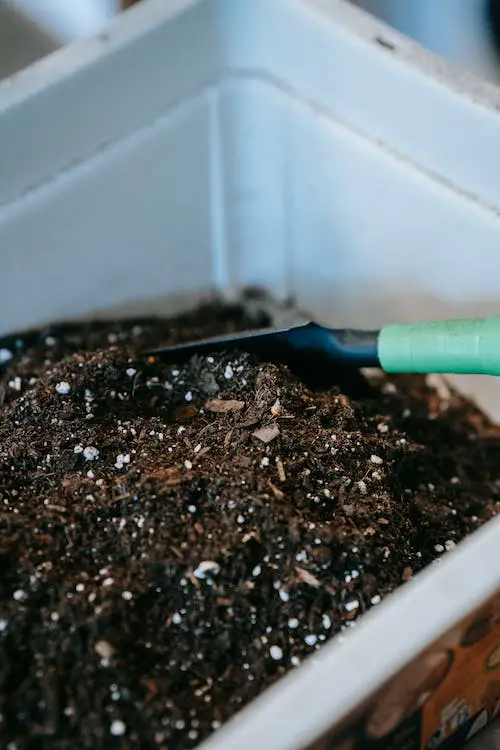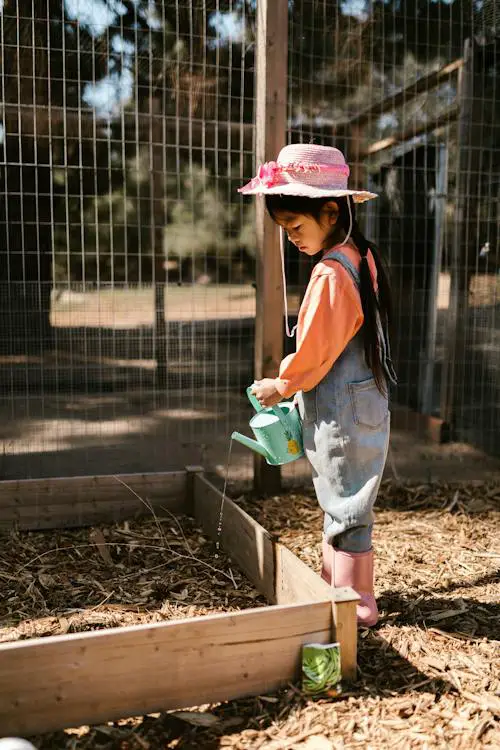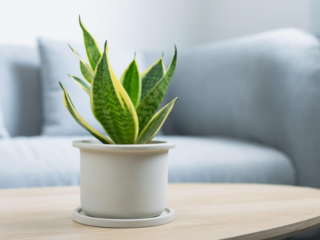Composting is a great way to turn your kitchen scraps and yard waste into a rich and natural fertilizer for your plants. But how long does it take for compost to break down and become ready to use? The answer depends on several factors, such as the type of materials you add, the size of the pile, the moisture level, the temperature, and the amount of aeration. In this blog post, we will explore these factors and give you some tips on how to speed up the composting process.
What is compost?

How Long Does Compost Take to Break Down
Compost is the end product of the decomposition of organic matter by microorganisms, such as bacteria and fungi. Compost contains nutrients, minerals, and humus, which improve the soil structure, water retention, and fertility. Compost also helps suppress diseases and pests and reduces the need for chemical fertilizers and pesticides.
What materials can you compost?
You can compost almost any organic material that was once living, such as fruit and vegetable peels, eggshells, coffee grounds, tea bags, grass clippings, leaves, straw, wood chips, paper, cardboard, and cotton. However, some materials are better than others for composting, and some should be avoided altogether.
The best materials for composting are those that are rich in nitrogen, carbon, or both. Nitrogen is the element that fuels the growth and activity of microorganisms, while carbon provides energy and structure. A good balance of nitrogen and carbon is essential for a healthy and fast composting process.
Nitrogen-rich materials are usually green, moist, and fresh, such as kitchen scraps, grass clippings, and manure. Carbon-rich materials are usually brown, dry, and woody, such as leaves, straw, and paper. A general rule of thumb is to aim for a ratio of 2 parts green materials to 1 part brown materials, by volume. This will give you a carbon-to-nitrogen ratio of about 20:1, which is ideal for composting.
Some materials that you should avoid adding to your compost pile are:
- Meat, bones, fish, dairy, and fats: These can attract rodents, flies, and other pests and cause bad odors and pathogens.
- Diseased or invasive plants: These can spread diseases or weeds in your garden.
- Pet waste: This can contain harmful parasites or bacteria that can infect humans or plants.
- Coal ash: This can contain heavy metals or toxins that can harm plants or soil life.
- Synthetic materials: These will not break down and can contaminate your compost.
How long does composting take?

The time it takes for compost to break down and become ready to use depends on many factors, such as the type of materials you add, the size of the pile, the moisture level, the temperature, and the amount of aeration. It could take anywhere from four weeks to a year or more.
The composting process can be divided into four stages: mesophilic, thermophilic, cooling, and maturing.
- Mesophilic stage: This is the initial stage, where the microorganisms start to break down the easy-to-digest materials, such as sugars and starches. This stage lasts for a few days, and the temperature of the pile rises to about 40°C (104°F).
- Thermophilic stage: This is the main stage, where the microorganisms break down the harder-to-digest materials, such as proteins and cellulose. This stage lasts for a few weeks, and the pile’s temperature can reach up to 70°C (158°F). This high temperature kills most weed seeds and pathogens and speeds up decomposition.
- Cooling stage: This is the stage where the temperature of the pile drops and the microorganisms slow down their activity. This stage lasts for a few months, and the compost starts to look like dark and crumbly soil.
- Maturing stage: This is the final stage, where the compost stabilizes and becomes ready to use. This stage lasts for at least six months, and the compost develops a pleasant earthy smell.
How do I speed up the composting process?
There are some things you can do to make your compost break down faster and more efficiently, such as:
- Chop or shred your materials. This will increase the surface area and make it easier for the microorganisms to access and digest them.
- Turn or mix your pile. This will introduce oxygen and redistribute the heat and moisture, which are essential for the microorganisms. You should turn or mix your pile at least once a week or whenever the temperature drops below 40°C (104°F).
- Keep your pile moist. This will provide water for the microorganisms and keep the chemical reactions going. You should keep your pile as moist as a wrung-out sponge, and water it if it becomes too dry.
- Add a compost activator: This is a substance that contains nitrogen microorganisms, or both, that can boost the composting process. Examples of compost activators are manure, blood meal, alfalfa, grass clippings, or commercial products.
- Use a compost bin or tumbler. This is a container that can hold your compost pile and protect it from the weather and pests. A compost bin or tumbler can also retain heat and moisture better and make it easier to turn or mix your pile.
How do you know when your compost is ready?
You can tell when your compost is ready by its appearance, smell, and feel. Your compost is ready when:
- It looks like dark and crumbly soil, with no recognizable materials.
- It smells earthy and sweet, with no foul or sour odors.
- It feels cool and moist, but not wet or sticky.
You can also test your compost by putting a handful of it in a sealed plastic bag for three days. If you open the bag and it smells sour, it means your compost is not ready yet. If it smells earthy, it means your compost is ready to use.
How to Use Your Compost?
You can use your compost in many ways to improve your garden and plants, such as:
- As a soil amendment, you can mix your compost with your existing soil to improve its texture, drainage, water retention, and fertility.
- As a mulch, you can spread your compost on top of your soil to suppress weeds, conserve moisture, moderate temperaturess, and prevent erosion.
- As a fertilizer, you can apply your compost to your plants to provide them with nutrients, minerals, and humus.
- As a potting mix: You can use your compost as a base for your potting mix or mix it with other ingredients, such as peat moss, perlite, or vermiculite.
Conclusion
Composting is a simple and rewarding way to turn your organic waste into a valuable resource for your plants. The time it takes for compost to break down depends on many factors, but you can speed it up by following some simple tips. When your compost is ready, you can use it in various ways to improve your soil and garden.
Frequently Asked Questions on the Topic of How Long Does Compost Take to Break Down?
-
Q: What is the difference between compost and mulch?
- A: Compost is the end product of the decomposition of organic matter, while mulch is any material that is spread on top of the soil to protect it. Compost can be used as mulch, but not all mulches are composted.
-
Q: How can I tell if my compost pile is too wet or too dry?
- A: A good way to check the moisture level of your compost pile is to squeeze a handful of it. If water drips out, it is too wet. If it falls apart, it is too dry. If it holds together but does not drip, it is just right.
-
Q: How often should I turn or mix my compost pile?
- A: You should turn or mix your compost pile at least once a week or whenever the temperature drops below 40°C (104°F). This will introduce oxygen and redistribute the heat and moisture, which are essential for the composting process.
-
Q: What are the benefits of using compost in my garden?
- A: Compost can improve your soil and plants in many ways, such as:
- Improving the soil structure, drainage, water retention, and fertility.
- Providing nutrients, minerals, and humus to your plants.
- Suppressing diseases and pests, and reducing the need for chemical fertilizers and pesticides.
-
Q: Can I compost cooked food, bread, or pasta?
- A: It is not recommended to compost cooked food, bread, or pasta, as they can attract rodents, flies, and other pests, and cause bad odors and pathogens. You can compost raw fruit and vegetable scraps, eggshells, coffee grounds, tea bags, and other plant-based materials.
-
Q: Can I compost citrus peels, onion skins, or garlic cloves?
- A: You can compost citrus peels, onion skins, or garlic cloves, but in moderation. These materials are acidic and can lower the pH of your compost pile, which can affect the activity of the microorganisms. You can balance the acidity by adding some lime, wood ash, or crushed eggshells to your pile.
-
Q: Can I compost paper, cardboard, or newspaper?
- You can compost paper, cardboard, or newspaper, as long as they are not glossy, colored, or coated with plastic or wax. These materials are rich in carbon and can balance the nitrogen from the green materials. You should shred or tear them into small pieces to speed up the decomposition.
-
Q: Can I compost weeds, grass clippings, or leaves?
- A: You can compost weeds, grass clippings, or leaves, but with some caution. Weeds can spread their seeds or roots into your garden, so you should only compost them if your pile reaches high enough temperatures to kill them. Grass clippings can clump together and create anaerobic conditions, so you should mix them well with other materials. Leaves can take a long time to break down, so you should shred them or mix them with green materials.
-
Q: How much compost should I use in my garden?
- A: The amount of compost you should use in your garden depends on your soil type and your plants’ needs. A general guideline is to apply 2 to 4 inches of compost on top of your soil and mix it well with the top 6 to 8 inches of soil. You can also use compost as a side dressing for your plants or as a top dressing for your lawn.
-
Q: How do I store my compost until I need it?
- You can store your compost in a covered bin, a plastic bag, or a pile in a shady and dry area. You should keep your compost moist but not wet, and turn it occasionally to prevent it from becoming compacted or anaerobic. You can also use a compost sifter to remove any large or unfinished materials before using your compost.




